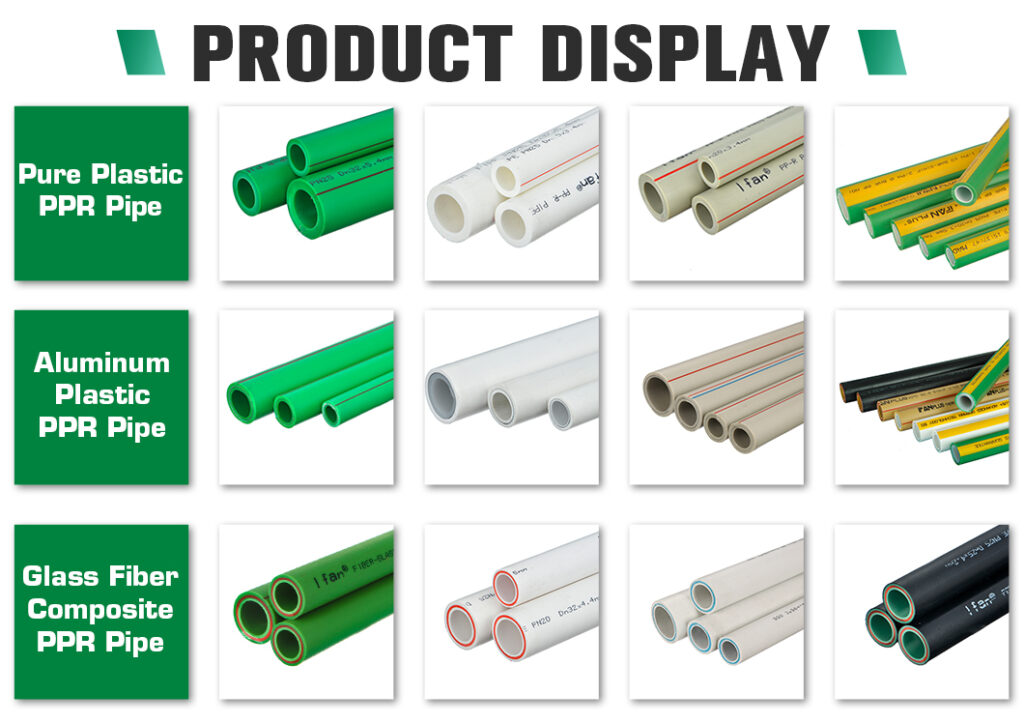Introduction:
The Versatile Applications of PPR Pipes ,PPR (Polypropylene Random Copolymer) pipes have become an integral part of modern industries, including construction, plumbing, HVAC, medical facilities, industrial operations, agriculture, and fisheries. Their exceptional performance and environmentally friendly characteristics make them a preferred choice. This article delves into the diverse applications of PPR pipes in various sectors, highlighting their key advantages.IFAN factory 30+ years manufacture experience support color/size customization support free sample.Welcome to consult for catalog and free samples.This is our FacebookWebsite: www.facebook.com.
1. Construction Industry:
PPR tubes find extensive use in the construction industry, primarily for water supply and heating systems. Their key advantages include:
High Pressure Resistance: PPR tubes can withstand high water pressure, ensuring the stability of water supply systems.
Corrosion Resistance: PPR tubes are impervious to chemical corrosion, ensuring longevity in water supply systems.
Non-Toxic and Environmentally Friendly: PPR pipes are made of polypropylene, free from harmful substances, and compliant with hygiene standards.
2. HVAC Industry:
In the HVAC sector, PPR tubes are employed for their excellent heat conduction properties, making them an ideal choice for heating systems. Additionally, the smooth inner surface of PPR pipes reduces water flow resistance, enhancing the efficiency of hot water circulation.

3. Medical Facilities:
PPR pipes are used in medical facilities for hospital and laboratory water supply systems. Their non-toxic, antibacterial, and durable characteristics comply with the sanitation standards. Moreover, PPR pipes do not release harmful substances, ensuring the purity of the water supply.
4. Industrial Applications:
PPR pipes demonstrate outstanding performance in various industrial applications, especially in chemical plants and pharmaceutical facilities. Their corrosion resistance allows them to transport corrosive chemicals without compromising product quality.
5. Agricultural Irrigation:
Agriculture benefits from PPR pipes for irrigation system construction. PPR pipes can withstand the high pressure of agricultural water, endure sunlight, and remain stable under diverse weather conditions, contributing to long-term sustainability.
6. Fisheries:
In the fisheries sector, PPR pipes are used for aquaculture system construction. Their corrosion resistance and long-term durability make them the preferred choice for both freshwater and marine aquaculture systems, ensuring sustainable fish farming.
7. Environmental Sustainability:
Beyond specific applications, PPR pipes are embraced for their environmental characteristics. Compared to metal pipes, the manufacturing and installation processes of PPR pipes result in a smaller carbon footprint, and they are recyclable. Additionally, their durability reduces maintenance needs and extends their lifespan, contributing to resource conservation.
Conclusion:
The widespread adoption of PPR pipes in various industries is attributed to their exceptional performance and environmental friendliness. Whether in construction, HVAC, medical, industrial, agricultural, or fisheries applications, PPR pipes provide reliable solutions. Moreover, their sustainability and eco-friendly features make them a preferred choice in an era focused on environmental preservation. As technology continues to advance, the PPR pipe industry will continue to play a vital role in providing durable, efficient, and sustainable solutions across diverse sectors.

